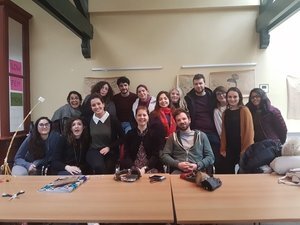Research in Groningen: Pronkjewail – a real gem!
Pronkjewail is a Doctoral Training Programme co-funded by Marie Skłodowska-Curie Actions*. This is a programme where 16 international PhD students have come to the University Medical Center Groningen at the University of Groningen to do research. All PhD students have opportunities to go on different secondments in academia and industry, and the overall goal of the project is ‘protecting patients with enhanced susceptibility to infections’. Our 16 projects are divided into four pillars: vaccines and primary prevention (1), personalized detection and infection prevention (2), iatrogenic influence on the microbiome (3) and personalized therapy/stewardship (4).
We asked all Pronkjewail PhD students to describe their research in their own words through two questions: What is your research about? and What could potentially be the future impact of your research? MindMint will be publishing the answers of PhD students working in each of the pillars. First, to pillar one:
1. Vaccines and primary prevention
Nilima Dinesh Kumar, India
Role of autophagy protein in the life cycle of mosquito-borne viruses
My research goal is to study the interplay between arboviruses and the human host. Arboviruses are viruses which are transmitted by mosquitoes. This includes Dengue, Zika and Chikungunya, all of which have become a major public health concern. My research aims to determine human cellular factors and pathways which either limit or help the replication of these viruses in a human cell.
In the long run, we want to be able to understand better the underlying mechanism how viruses have adapted strategies to evade these different cellular factors. A more thorough understanding of these viral-host interactions is important to develop potential therapeutics against these viruses.
Federica Sicca, Italy
Outsmarting influenza virus immune escape
My research focuses on the study of the development of influenza-specific immunity across the years on an individual base. We are also interested in the impact that influenza pre-existing immunity has upon influenza vaccination.
Understanding how to manipulate influenza-specific pre-existing immunity to our advantage is very important for the future design of more efficacious influenza vaccines.
Anne-Grete Märtson, Estonia
Optimized administration of antimicrobial drugs for prophylaxis in immunocompromised patients
In our group we are focusing on how to find the right dose for the right patient. In the general population there is big variability between patients, thus every patient cannot receive the same dose. Trough measuring drug concentrations from blood we aim to seek the actual exposure of different medications to achieve better treatment outcomes in the end.
We aim to develop different dosing algorithms to aid in prevention of different infections and viruses among transplant recipients. This means we look at dosing of specific medications that are used for prevention of infections. Overall this research helps to improve routine care of infections in this vulnerable patient group.
Usma Koser, Scotland
Innovative fiber-based molecular fluorescence endoscopy in suspected lung infections
Deep lung infections are common and can make people very unwell. In addition to this, they can be difficult to definitively diagnose. We are working with new technology to provide an accurate and more rapid answer for doctors so they can specifically treat these patients. This will hopefully improve outcomes from these infections, especially in vulnerable groups such as people with weakened immune systems and patients needing intensive care.
More broadly, this is aimed to decrease the growing burden of "antibiotic resistance", a term used to describe the ability of bacteria and other organisms (bugs) capable of infection, to avoid the mechanisms antibiotics have to kill and treat them. This is a growing global public health concern and, researchers, medical staff, politicians and the public must be aware of it and act now and together to prevent it!
* Grant Agreement number: 713660 — PRONKJEWAIL — H2020-MSCA-COFUND-2015

